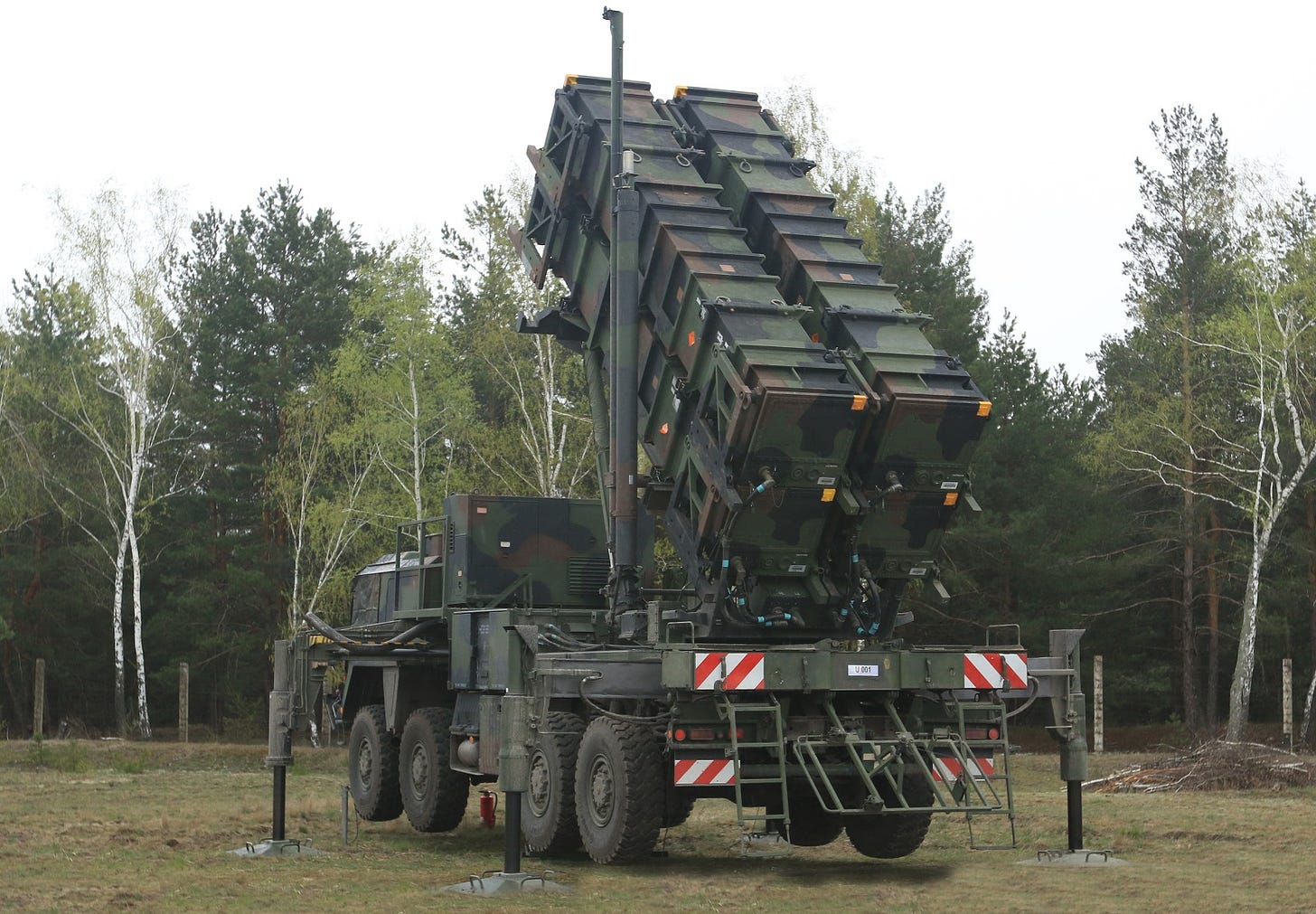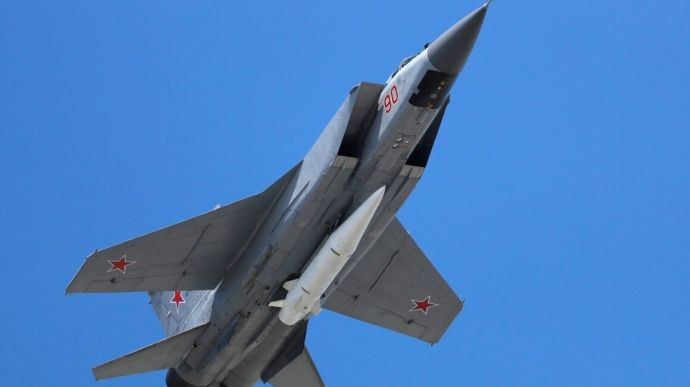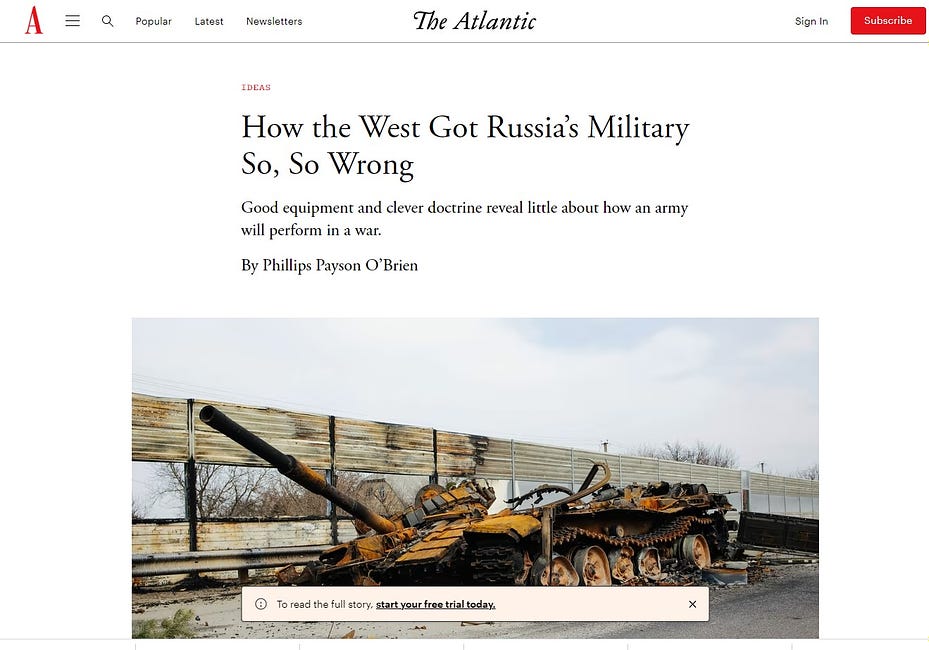Bloviating dictatorial regimes over-hyping their wonder weapons? Think Hitler's vengeance rockets. And now think Putin and his supposedly indestructible hypersonic missile, shot down by Ukrainians using a US Patriot missile on which they had a couple of months training. The world is learning the difference between the Russian system and the NATO system. The implications are clear. JL
Phillips O'Brien reports in his substack:
Dictatorships love to boast about wonder-weapons, partly to legitimate their rule domestically, but also to intimidate opponents. Usually there is a great element of self-deception involved in this—and it seems Putin’s Russia indulged. Even more impressive was the Ukrainian ability to learn to operate and then shoot down the kinzhal. Going into the war it was regularly stated by the analytical community that it would be useless to give Ukraine advanced weapons, because they would not be able to make use of them. The Ukrainians shot down the hypersonic Kinzhal missile, using a US Patriot anti-missile system they had only been training on for months and which had just gone into operationWell, the line didn’t move much if at all in the last week, but that didn’t stop it from being a very important one in revealing much about how and why the war has developed in the way that it has, and how it might develop in the future. The most revealing story was that the Ukrainians shot down one of Russia’s most advanced (and praised) systems—the hypersonic Kinzhal missile, using a US-manufactured Patriot anti-missile system that they had only been training on for months and which had just gone into operation.
Kinzhals vs Patriots and the fact that System Matters
To understand why I believe this is really important, we need to step back to before February 24, 2022. At that point, major figures in the analytical community, were arguing that Ukraine should not be provided with such advanced systems. It was thought that the war would not last long enough for them to make a difference, that Ukraine could not stand up to Russia in a conventional war, that it would take too long for the Ukrainians to be trained up on them, etc, etc.
Such an argument seemed based in an overall ‘realist’ understanding of how power and war should be understood. For realists, such as John Mearsheimer, Stephen Walt and others, political systems and domestic politics are relatively unimportant factors in state behavior. Mearsheimer even defined realism in this way quite recently.
““Realism is a theory that basically says states care about the balance of power above all else. States want to make sure that they have as much power relative to other great powers as possible. It’s a theory that pays little attention to individuals and pays little attention to domestic politics.”
In this vision, all states regardless of type, work constantly to improve their relative position in the power structure, so spending much time wondering about how different political systems or individual leaders behave, its not terribly important.
Now, as I’ve said for a long-time now (and hopefully much of my published research backs this up) the type of system fighting a war actually matters hugely. Dictatorships are generally inefficient and prone to leader-worship, leading to really bad strategic decision-making. Stalin, Hitler, Mussolini and Imperial Japan all were severely handicapped by being dictatorships in World War II. On the other hand, democracies can be more flexible and less prone to making terrible decisions based on the whims of their leaders, than dictatorships. They are also far more likely to create more advanced armed forces (partly because they actually dont want to sacrifice their populations if they dont have to).
One of the things that therefore seemed completely counter-intuitive going into Putin’s full-scale invasion was that fact that the Russian system seemed either relatively unimportant in assessing how the Russians would fight, or even in some cases even a positive. It was as if a dictatorship created armed forces should be seen as something that could make up for the fact that Russia was weak economically or suffering from a demographic timebomb. Perhaps no one argued for the primacy of Russian military power in making a Russia great than Michael Kofman. He published a number of pieces before 2022 arguingthat Russian decline was a ‘myth’ and that Russia remained a military great power. Maybe the most well known was ‘The Myth of Russian Decline’—below is a link to that and two more if you want to read his arguments.
https://www.foreignaffairs.com/articles/ukraine/2021-10-19/myth-russian-decline
https://defense360.csis.org/bad-idea-dismissing-russia-as-a-declining-power-in-u-s-strategy/
https://warontherocks.com/2020/02/russian-demographics-and-power-does-the-kremlin-have-a-long-game/
Needless to say realists and analysts who discounted the affect of political systems and spent time discussing Russia as a military great power, assumed that the Russian military would dominate the Ukrainian military when the full-scale invasion happened.
It didnt happen that way, of course.
Actually, this war has shown that regime-type matters very much—something that we can see, I would argue, in the Kinzhal-Patriot event. First, I have no idea how well the Kinzhal actually performs, but it seems that all the boasting of Putin acolytes that the Kinzhal would be very difficult if not impossible to shoot down because of its supposed high-tech performance characteristics—was nonsense. That the Ukrainians could shoot one down with a system they had just learned on almost immediately after they have made that system operational, shows that the Kinzhal cannot have been quite the amazing weapon that the Russian backers said it was. We should not have been surprised—dictatorships love to boast about wonder-weapons, partly to legitimate their rule domestically, but also to intimidate their opponents. Usually there is a great element of self-deception involved in this—and it seems that Putin’s Russia indulged in such self-deception.
However even more impressive in the other way, was the Ukrainian ability to learn to operate and then shoot down the kinzhal. Going into the war it was regularly stated by the analytical community that it would be useless to give Ukraine advanced weapons, because they would not be able to make use of them. Rob Lee told British parliamentarians that Ukraine stood no chance in a conventional war with Russia, so Ukraine should not be provided advanced conventional systems. I wrote about that here in my widweek update.
The Bakhmut Analysis: Being Definite and Being Flexible
·Since well before February 24,2022, Ive been completely befuddled by the very strong claims made by the analytical community about how supposedly strong the Russian Army was and how supposedly weak Ukraine was. It was everywhere in the analysis—that Russian armed forces were easily some of the best in the world, that the Ukrainians would have no chance to stand up to them in the open field, and that things were so bad, that the Ukrainians might not even be able to muster an insurgency.
This is just one example of many. Maybe the most famous was Samuel Charap’s frankly ridiculous article that ‘The West’s Weapons Won’t Make Any Difference to Ukraine.”
https://foreignpolicy.com/2022/01/21/weapons-ukraine-russia-invasion-military/
One of the main thrusts of these arguments was that Ukraine would not have the time to learn how to operate advanced western systems (such as Patriots). Alot of this seems to have been based on a combination of how quickly they assumed the Russian military would overwhelm the Ukrainians and the long-training time the US usually allocates for such equipment.
Actually what this war has shown is that a democratic, committed nation such as Ukraine can achieve things far more quickly and efficiently than a dictatorship. The Ukrainians learned how to operate the Patriot in record time—only a few months. The US announced the Ukrainians were learning the Patriot only in January, and here we are in May and the system is deployed and obviously being used effectively.
https://www.politico.com/news/2023/03/21/ukrainian-soliders-patriot-missile-training-oklahoma-00088166
This is a very hopeful sign for Ukraine going forward in this war. This one incident highlights the inherent flaws in dictatorial war-making and the advantages of democracies with societal support. Long may this continue.
Bakhmut and Russian losses
US National Security spokesperson John Kirby and Yevgeny Prigozhin probably have little in common. However this week they were united in their description of the huge losses that the Russians are suffering in their frankly bizarre attempts to take the whole city of Bakhmut (one of the smallest cities in Ukraine before last year). Kirby, in a press conference, dwelt on the ‘terrible, terrible’ losses that Russia has suffered to take Bakhmut.
https://twitter.com/PhillipsPOBrien/status/1653291972700909569?s=20
Prigozhin went one step further and a few days later even filmed himself standing in front of the bodies of those who had been lost, as part of a frankly weird video of him threatening to withdraw Wagner from Bakhmut. I wont link to the video of him with the corpses (you can find it for yourself if you really want to see it), but here is one of him threatening to leave Bakhmut because of the losses.
https://twitter.com/NOELreports/status/1654397764569104384?s=20
This is not the sign of a competent, well-led Russian military that knows what it wants and how to do it. What the Ukrainians have done in forcing the Russians to fight for Bakhmut, is put strain exactly on some of the greatest weak points in the Russian military—its overall command, its inability to advance without taking great losses, etc. It does seem that structurally, the Russian military is showing serious cracks because of the Battle of Bakhmut.
A Drone attacks the Kremlin and some People attack the ISW
On the evening of May 3, something very strange occurred. Two what seemed to be simple UAVs with small payloads hit the roof of some Kremlin building and did superficial damage.
https://twitter.com/olliecarroll/status/1653752188508811267?s=20
I have no idea what happened here. It didnt seem like an operation consistent with Ukrainian operations, so I had my doubts it was them, however I dont know. Other ideas that were circulated was that this was a Russian dissident group trying to embarass the Putin government or that this was a Russian false-flag event designed to give the government cover to undertake some acceleration of the Russian war effort, etc. The Institute for the Study of War (which in early March 2022 was one of the first think tanks to understand that the Russian military was far weaker than the analytical community had stated), assessed that they thought it was a Russian false-flag, and released a tweet thread about why.
https://twitter.com/TheStudyofWar/status/1653906530087890947?s=20
For some reason, this tweet thread caused some to get up on their high horses and attack the ISW. The reaction seemed entirely out of proportion to me, and I said so.
https://twitter.com/PhillipsPOBrien/status/1654200485342072850?s=20
Look, I dont know what the hell happened (other than the fact that it seems already to have blown over). But I would like to say that ISW has done some excellent and valuable work since the full-scale invasion on February 24, 2022.
























0 comments:
Post a Comment